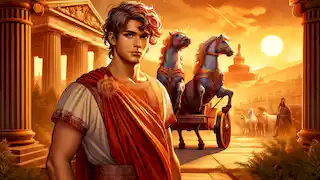Once upon a time, in ancient Greece, a tale of courage, love, and cunning unfolded—a tale that laid the foundation for what would become one of the greatest celebrations of athletic prowess in history: the Olympic Games.
In the kingdom of Pisa, located in the region of Elis, there lived a proud and powerful king named Oenomaus. This king was renowned for his fierce chariot-racing skills and the many suitors he had defeated in races to win the hand of his beautiful daughter, Hippodamia. Oenomaus, however, was not willing to part with his daughter so easily. An oracle had prophesied that he would die at the hands of his son-in-law, so he devised a cruel challenge for any potential suitor: they must race him in a chariot contest. If they won, they would marry Hippodamia; if they lost, they would pay with their lives.
The race was set from Pisa to the Isthmus of Corinth, and the conditions were harsh. Oenomaus had an unbeatable advantage: his chariot was drawn by divine horses, a gift from the god Ares, and driven by Myrtilus, a skilled charioteer. Many brave men had tried their luck, only to meet their doom.
One day, Pelops, a young prince of Lydia, arrived in Greece. He was the son of Tantalus, a man notorious for his heinous crimes against the gods, but Pelops was favored by the gods for his own nobility and charm. Determined to win Hippodamia's hand, he approached King Oenomaus to accept the challenge.
Pelops was not just any suitor; he was determined and resourceful. As the day of the race approached, he sought the help of Myrtilus, Oenomaus' charioteer. He offered Myrtilus half of the kingdom and the promise of a night with Hippodamia if he helped him win the race. Myrtilus, who secretly desired Hippodamia and saw an opportunity for power, agreed to betray his master. He replaced the bronze linchpins of Oenomaus' chariot with ones made of wax.
On the day of the race, as Oenomaus and Pelops prepared to set off, Hippodamia, filled with anxiety, prayed for Pelops' victory. As the race commenced, Oenomaus took an early lead, his divine horses speeding across the plains. Pelops, driving his chariot with all his might, struggled to keep up. However, as they neared the finish line, the sun's heat melted the wax linchpins on Oenomaus' chariot, causing the wheels to fly off. Oenomaus was thrown from the chariot and died, fulfilling the prophecy. Pelops, victorious, claimed his prize and married Hippodamia.
However, the story does not end here. After the race, Myrtilus attempted to claim his reward. Pelops, unwilling to share Hippodamia and the kingdom, pushed Myrtilus off a cliff into the sea. As he fell, Myrtilus cursed Pelops and his descendants, a curse that would bring misfortune to his lineage for generations.
Despite this tragic end, the victory of Pelops became legendary. To commemorate his triumph and the death of Oenomaus, Pelops instituted a festival that would eventually become the Olympic Games. The site chosen was Olympia, where a grand sanctuary was built, dedicated to Zeus. Here, athletes from all over Greece would gather every four years to compete in various sports, honoring the gods and seeking glory.
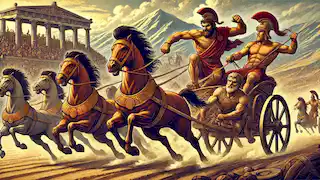
The Olympic Games became a symbol of unity, bringing together the often-warring Greek city-states in a time of peace. The competitions included running, wrestling, boxing, and the chariot race, echoing the legendary race of Pelops and Oenomaus. Victors were crowned with olive wreaths and celebrated as heroes.
Pelops himself became a revered figure in Greek mythology. His name and deeds were immortalized in epic poems and stories, and the Peloponnesian Peninsula was named in his honor. His legacy continued through his descendants, who played significant roles in Greek myths, including the tragic tale of the House of Atreus.
The story of Pelops and the Olympic Games is a testament to the enduring power of myth and tradition. It illustrates the themes of ambition, betrayal, and the quest for glory, which have resonated throughout the ages. The Olympic Games, born from this ancient tale, continue to symbolize the ideals of excellence, competition, and unity, bringing together nations from around the world in the spirit of friendly competition.
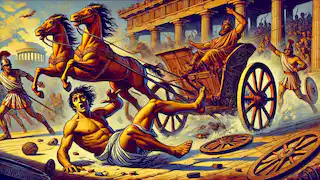
As the centuries passed, the Olympic Games evolved, adapting to the changing world. Yet, the core spirit of the Games remained true to their origins, celebrating human potential and the pursuit of greatness. From the ancient stadiums of Olympia to the modern arenas that now host the Games, the legacy of Pelops and his race with Oenomaus lives on.
Today, the Olympic torch travels across continents, symbolizing the enduring flame of competition and camaraderie first kindled by the ancient Greeks. The story of Pelops is a reminder of the rich history behind this global event, connecting the present with a distant, mythic past. As athletes strive for excellence and nations come together, they participate in a tradition that is not merely about winning, but about honoring the spirit of humanity itself.
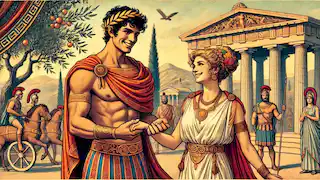
And so, the tale of Pelops and the Olympic Games is more than just a story; it is a celebration of the enduring human spirit, the desire to achieve greatness, and the importance of unity. It reminds us that even in a world filled with challenges and competition, there is room for honor, respect, and a shared sense of purpose. Just as Pelops raced for love and glory, today's athletes compete not only for medals but for the pride of representing their nations and the joy of participating in a timeless tradition.
The Olympic Games continue to inspire millions around the world, fostering a sense of global community and a shared commitment to peace and excellence. The legacy of Pelops and the heroes of ancient Greece lives on, reminding us that through determination, courage, and fair play, we can all achieve greatness.
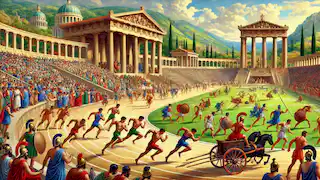
In the end, the story of Pelops and the Olympic Games is a timeless tale of heroism, competition, and the pursuit of excellence. It is a story that continues to inspire generations, reminding us that the quest for greatness is a journey that transcends time and place. As we look forward to each new Olympic Games, we honor not only the athletes who compete but also the rich heritage that has shaped this extraordinary event. The spirit of Pelops, the ancient hero who raced for love and honor, lives on in every athlete who strives to reach the pinnacle of their sport, making the Olympic Games a true celebration of human potential and achievement.
And so, as the torch of the Olympic flame burns bright, we celebrate the story of Pelops and the Olympic Games, a tale that continues to inspire and unite us all.
